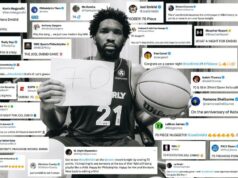What is it about this team and season? It’s just uncanny how familiar it all is, as if we’ve seen this all before. This script, it feels as if it’s already been written.
Of course, just about the time one comes to that kind of a realization, has it crystallized in their mind and believes they may have just found the trend to foretell what’s to come, that’s usually about the time someone gets slapped upside the head.
Bill S. Preston Esquire (via So-crates):
The only true wisdom consists in knowing that you know nothing.
With all due respect to Bill and Ted (and So-crates), I know something—even if I’m not exactly sure what the hell it is.
I’d like to think I’m a grateful San Antonio Spurs fan. I’ve been around long enough to witness the entirety of David Robinson’s career and experience some of the highest of highs and lowest lows a fan can have in that time. But it’s never precluded me from playing the “What if?” game: What if Tim Duncan is available for the 2000 playoffs? What if the Big Three never played internationally? What if 0.4 was disallowed or Dirk was never fouled? What if the 2002-03 Spurs had been able to come back intact the following year; or what if they had been able to start their season the way this 2010-11 team has, with a roster full of familiarity, continuity, good health and a collective chip on their shoulder? Would it have looked anything like 40-8?
If I could take you back prior to the season and have a conversation with you about the upcoming year, how would you have felt about this Spurs team being compared to their 2002-03 championship predecessor? Would it have been off base, easily dismissed? Had you already hearkened back yourself to that championship season or had someone brought it up in passing, in conversation, on a message board or blog? Would it have been nothing more than a little wishful thinking, reading into some not-so-spectacular coincidences or similarities?
Allow yourself to skew away from the one-for-one comparison, even if there are some to be found—one of the league’s all-time good guys stating publicly it’d be his last year (Robinson then, McDyess now); the prototypical-sized small forward showing a proclivity for the spot-up and fourth quarter (Jackson then, Jefferson now); one clear-cut primary defender with a penchant for the corner (Bowen then, Hill now); a burly, undersized big man bringing his hustle and energy to the floor (Rose then, Blair now), a highly-touted rookie import looking to overcome early injury to make a championship contribution (Ginobili then, Splitter now); and a first-round draft pick netting a young player that addressed a need allowing him to contribute immediately (Claxton then, Anderson now). There’s no question you could find some commonality on a one-for-one basis. But McDyess isn’t Robinson’s equivalent nor is Splitter Ginobili’s or Jefferson Jackson’s or Hill Bowen’s and so forth. And that’s why you look at it as a whole. The sum of the parts, not the parts of the sum.
One hundred dollars is one hundred dollars which ever way it comes. You can make change any number of ways, using a multitude of bills and/or coins, and by doing an endless amount of things (some more legal than others). But in the end, the sum is the same: one hundred dollars.
But how do you go about equating the sum of a team’s parts for comparison’s sake? John Hollinger’s famous Player Efficiency Rating (PER) is not without flaw but it provides a pretty decent measure of individual talent and their quality of contribution. So if it’s good enough for you, and I feel it only appropriate to ask, than it’s good enough for me. It is? Good deal. Let’s do it to it:
2002-03 Regular Seaso n
n
| Player | PER |
| T. Duncan | 26.9 |
| D. Robinson | 17.8 |
| T. Parker | 16.5 |
| M. Rose | 16.1 |
| C. Claxton | 15.9 |
| M. Ginobili | 14.7 |
| S. Jackson | 14.5 |
| D. Brown | 13.8 |
| K. Willis | 12.5 |
| S. Smith | 12.0 |
| S. Kerr | 11.4 |
| B. Bowen | 9.1 |
| D. Ferry | 5.1 |
| Total: | 186.2 |
 2010-11 Regular Season (48 Games)
2010-11 Regular Season (48 Games)
| Player | PER |
| M. Ginobili | 23.0 |
| T. Duncan | 21.5 |
| T. Parker | 20.7 |
| D. Blair | 16.6 |
| G. Hill | 14.5 |
| M. Bonner | 14.0 |
| T. Splitter | 13.7 |
| J. Anderson | 13.5 |
| R. Jefferson | 13.5 |
| A. McDyess | 12.3 |
| G. Neal | 12.0 |
| C. Quinn | 10.6 |
| Total: | 185.9 |
Alright, so I’ve got to come clean. I wasn’t expecting that to work out all that great. I was fully expecting to either have to manipulate the numbers or find another angle altogether. I quite enjoy this “things working out” stuff.
Suffice to say, one hundred, eighty-six is one hundred, eighty-six, however which way you come to it. Plenty of names and faces have changed, some faces have remained the same with the change coming in their game—for better or worse. But the sum of their parts remains the same: one hundred, eighty-six.
Forty-eight games isn’t eighty-two and I understand the skepticism to find it an apt comparison. But keep something in mind, the 2002-03 Spurs were a team in transition. They brought eight players back from the previous year, one of which (Jackson) was merely on the roster. Robinson dealt with and battled through an assortment of back, hip and knee issues costing him four games in their first forty-nine. Tony Parker was in his second year and learning a complex Spurs system at one of the most demanding positions in the NBA (point guard) on the fly. Manu Ginobili was a rookie coming into camp hobbled trying to transition his game to the NBA and a coach less than enthused with is flair. Claxton, a player brought in to compete and create depth at a thin point guard position, was lost from Nov. 1 to Feb. 15.
Point is, no one—including the Spurs themselves—knew exactly who they were. Contention was seemingly a year away when they could sign another max free agent. It took time for the Spurs to gel and become the team they truly were.
And when they did? Well, they looked like a different team. Much like the 2010-11 team that came into the season with lowered expectations, the Spurs took off once they built chemistry, continuity and had all of their pieces on the floor. The 2002-03 Spurs started the season 21-13. They finished 39-9—and their ninth loss came on the final day of the season, Tim Duncan sitting against the Mavericks with the Spurs having home court already locked up.
![[Bill:] A most triumphant post by Kap, Ted. [Ted:] Dude. I know . . . [Bill:] A most triumphant post by Kap, Ted. [Ted:] Dude. I know . . .](http://img2.timeinc.net/ew/dynamic/imgs/050711/165035__bt_l.jpg) So what does this all mean? Does the fact that Speedy Claxton and James Anderson filled similar but different roles, both suffering injuries that sidelined them from early November to essentially February, mean they will also share a place in Spurs’ playoff lore? Does the fact that both the 2002-03 team and 2010-11 team suffered a double-digit loss on the first game of their Rodeo Road Trip mean they’ll both share an 8-1 record when the Spurs finally head home? Could instead of comparing the team on a one-for-one comparison basis but as a sum of their parts be the trend that foretells what’s to come of this Spurs season—could a combination of players become the means to match the contributions of players like Stephen Jackson and Steve Kerr; could maybe Tiago Splitter have a Kevin Willis-type impact against the Lakers for the Spurs? Is it possible that the Spurs’ new offensive disposition and approach to today’s game compensates for what they’ve lost from their defensive predecessors to net the same sum?
So what does this all mean? Does the fact that Speedy Claxton and James Anderson filled similar but different roles, both suffering injuries that sidelined them from early November to essentially February, mean they will also share a place in Spurs’ playoff lore? Does the fact that both the 2002-03 team and 2010-11 team suffered a double-digit loss on the first game of their Rodeo Road Trip mean they’ll both share an 8-1 record when the Spurs finally head home? Could instead of comparing the team on a one-for-one comparison basis but as a sum of their parts be the trend that foretells what’s to come of this Spurs season—could a combination of players become the means to match the contributions of players like Stephen Jackson and Steve Kerr; could maybe Tiago Splitter have a Kevin Willis-type impact against the Lakers for the Spurs? Is it possible that the Spurs’ new offensive disposition and approach to today’s game compensates for what they’ve lost from their defensive predecessors to net the same sum?
How the hell should I know?
True wisdom. Thanks, Bill and Ted (and So-crates).
Follow Nick Kapsis @Kap10Jack





